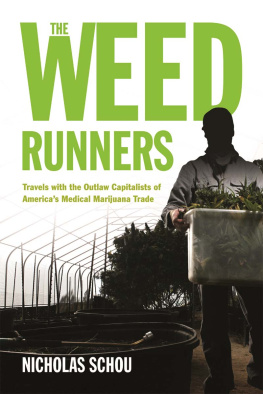
Copyright 2013 by Nicholas Schou
All rights reserved.
Portions of this book previously appeared in OC Weekly
First edition
Published by Chicago Review Press, Incorporated
814 North Franklin Street
Chicago, Illinois 60610
ISBN 978-1-61374-410-9
Cover design: Matt Simmons
Interior design: Sarah Olson
Library of Congress Cataloging-in-Publication Data
Schou, Nick.
The weed runners : travels with the outlaw capitalists and modern-day bootleggers of Americas medical marijuana trade /Nicholas Schou.First edition.
pages cm
Includes index.
Summary: Drawing on unparalleled access to sources ranging from doctors and lawyers to lobbyists, cannabis club owners, outlaw cultivators, and industry entrepreneurs, The Weed Runners is both journalistic expose and adventure story. The books title refers to those who run the vast network fueling the ongoing nationwide explosion of medical marijuana. Focusing on an incredibly dynamic three-year period from 2009 to 2012, this fast-moving and exciting portrait examines the lives of the people involved in todays marijuana trade and recent developments in the federal war on medical marijuana. Unlike other books on the topic, this narrative gives readers a first-hand account on Americas quasi-legal medical marijuana tradeProvided by publisher.
Summary: A behind-the-scenes look at the quasi-legal business of medical marijuana and the people who risk their liberty to push the limits of this grand experimentProvided by publisher.
ISBN 978-1-61374-410-9 (pbk.)
1. Marijuana--Therapeutic useUnited States. 2. Drug legalizationUnited States. 3. LobbyingUnited States. 4. Marijuana industryUnited States. I. Title.
RM666.C266S36 2013
362.295dc23
2013011343
Printed in the United States of America
5 4 3 2 1
Contents
Index
Acknowledgments
Writing a book about the inner workings of Americas marijuana industry, where the lines between what is legal and what is not so legal are so blurry as to defy definition, is no easy task. By definition, however, the risks facing the subjects of such a manuscript are far greater than those faced by the writer. Therefore, Id like to thank everyone who spoke to me for this book and who helped me with my coverage of the medical marijuana movement for OC Weekly over the past sixteen years.
Many of these sources appear in this book, although for obvious reasons and where clearly stated, I couldnt always use their real names. Id also like to thank my editor and partner in crime at the Weekly, Gustavo Arellano, for his support of my efforts, as well as Voice Media Group for giving me permission to use previously published material from my years of work on this project. As always, thanks also to my literary agent, Jill Marsal, and to my wife, Claudia, for her guidance and support.
Introduction
It might be a stretch to say that the history of Americas underground marijuana trade is encapsulated in the story of Donald Hoxter.
Not by much, though.
Few people can say theyve smuggled as much as ten tons of marijuana across both the Mexican and Canadian borders per year. Or that they were one of the first hippies in the Pacific Northwest to pioneer Americas homegrown crop in the early 1980s, some fifteen years before marijuana became legal, first in California, and then in more than a dozen other states, for medical purposes. And its certainly true that few have won or lost as much as Hoxter in this business. His story, which ends before the tales contained in this book begin, is therefore a perfect place to start.
At the moment, Hoxter is sitting at an outdoor table at a coffee shop in Long Beach, California, at a busy intersection, kitty-corner from an elementary school where kids are loudly enjoying their afternoon recess. Hes a tall, lanky man in his early sixties with whitening red hair and freckles. His fair skin is mottled red and white, permanently scorched by forty-one straight months in the too-sunny recreation yard of a federal prison. A fresh cigarette dangles from his lips. Hes almost lit the thing several times over the past hour or so, but instead absentmindedly twirls the lighter with his left hand.
Hoxter is too busy talking to smoke. The memories, some of which are still a jumble in his mind since he hasnt spoken publicly about much of his life until now, overflow. It all started in the early 1960s, he says, when he was a kid in El Cajon, a gritty, working-class town just east of San Diego. Then as now, El Cajon was a bastion of the Hells Angels, and several members of the outlaw motorcycle gang happened to live on the street where Hoxter grew up. They lived on the same block, much to my mothers chagrin, remembers Hoxter. I got my first joint from the Hells Angels. They cost about four for a dollar back then. And of course they came from Mexico. Mexico is where everything came from in the beginning.
Hoxter hung out with older kids and young adults who tended to drive down to Tijuana each weekend. He didnt realize it right away, but a lot of them werent just crossing the border to get drunk in the cantinas of the infamous Zona Norte. A friend of mine came back one time, and was laughing and joking and opened up the trunk of his Chevrolet, he recalls. The friend lifted up some unfolded newspapers and proudly showed Hoxter several bricks of cheap Mexican grass. Even before Hoxter was old enough to drive, he was going along for the ride, and by the time he had his license, he was a smuggler. It was nothing. You just drove down and drove back, he recalls. Going into Mexico, there was no police presence, and coming back you just played it like you had gotten drunk because thats what people did.
Typically, Hoxter and his friends would find a back-alley dealer, pool their money, and purchase about two pounds of pot that had been packed into tight bundles, or bricks. Each one cost $60 or $70. Then theyd sell each pound for $300, dividing the amount into thirty lids, or $10 quantities, which were measured by a fingers width of a Prince Albert can of tobacco. By the late 1960s, he and his buddies were handling much larger loads, thirty or forty pounds at a time, which theyd typically stash in the bottom of a boat and then attach to their legs with rope before swimming ashore. Meanwhile, theyd formed their own commune in San Diego called the Family, and had hooked up with the Brotherhood of Eternal Love, a group of hippies and surfers living in cheap houses in Laguna Beach who were smuggling untold quantities of hashish from Afghanistan and transporting massive quantities of Mexican weed across the border.
Smuggling and selling hash and marijuana became a way for the Family, the Brotherhood, and legions of other hippies to finance their alternative lifestyles. As more young people started tuning in, turning on, and dropping out, the demand for Mexican buds grew even higher, and Hoxter was often handling shipments of one thousand or one thousand five hundred pounds at a time. Because of the volume they handled, the various drug networks operating at the time soon had no use for Tijuana middlemen and had hooked up directly with individual villages in the Mexican states of Sinaloa, Jalisco, or Michoacan, where growing marijuana had long been a way of life. The Family patronized one particular hamlet high up in the hills of Michoacan, an hour or so south of Morelia. After a decade of cross-border enterprise, the jungle township had doubled in size and enjoyed electricity, plumbing, and paved roads.
Next page







